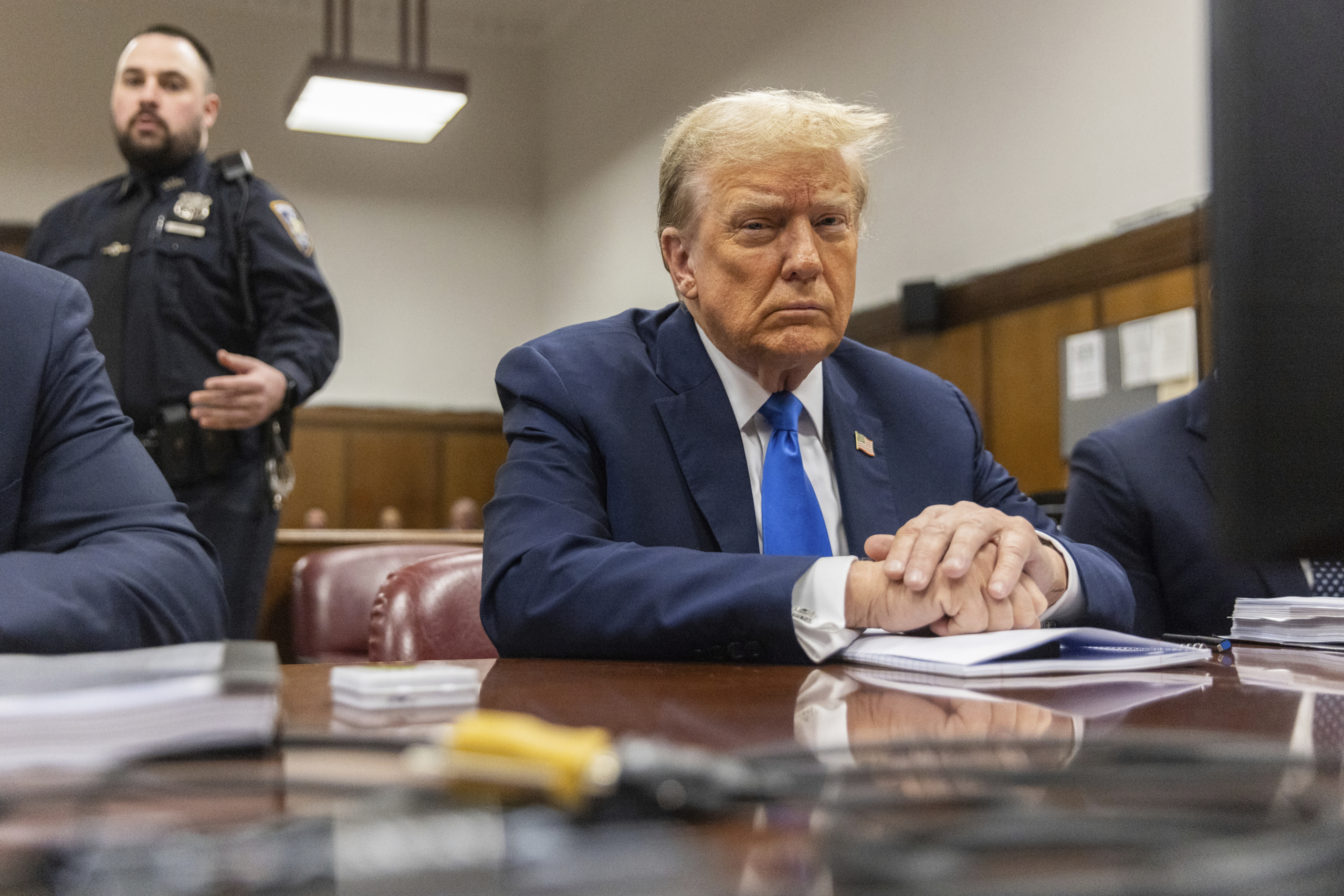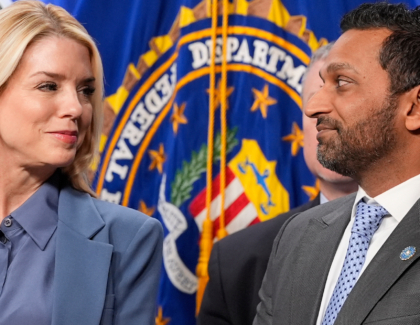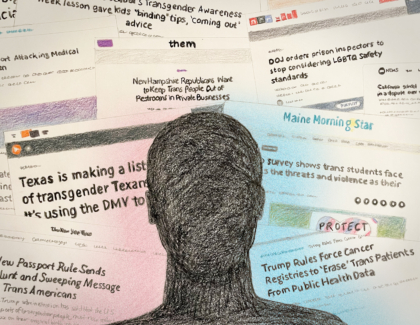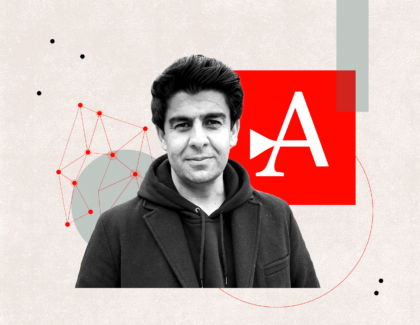Sign up for the daily CJR newsletter.
Donald Trump’s first criminal trial is underway, but the only way the public is finding out about it is through secondhand accounts.
Journalists are assiduously relaying what’s going on within the courtroom to the outside world. But New York State’s prohibition on cameras in the courtroom means Trump and his allies can simply lie about what’s actually happening—and be believed by a large chunk of the population, with others unsure of who to trust.
This is already occurring. On Monday, Trump exited the courtroom and declared in front of the cameras that judge Juan Merchan was interfering with his ability to attend his son Barron’s high school graduation.
“It looks like the judge will not let me go to the graduation of my son,” Trump declared. He went even further later that evening, posting on social media that Merchan had “prohibited” him from attending. That claim was immediately picked up by Fox News and other right-wing outlets as uncontested fact—and evidence that Merchan was biased against the former president.
But that’s not what happened. Merchan, in fact, had said that he wasn’t ready to rule on the question.
“It really depends on if we are on time and where we are in the trial,” Merchan said, according to a pool report and the court transcript. “If everything is going according to schedule without unnecessary delays, then I am sure we will be able to adjourn.”
Reporters earnestly fact-checked the false claim. But we’re at a disadvantage. Trump, a master of media manipulation who excels at using TV time to push his agenda, made his comments for all to see, while Merchan’s remarks could only be relayed indirectly by journalists. Trump can go direct to consumer; news outlets must work around an outdated state law that precludes the public airing of visual evidence of the truth. And while there’s a large section of the public who will trust whatever Trump has to say over what reporters report, video evidence is a lot harder to dispute.
Of course, there was another big moment on the first day that showed why cameras are needed: Trump appeared to fall asleep in court.
Multiple publications reported this, including The Guardian, for which I’m writing the Trump on Trial newsletter (and covering the trial remotely from DC). Trump’s campaign denied this happened: “This is 100% Fake News coming from ‘journalists’ who weren’t even in the courtroom,” a Trump spokesman said in a statement to multiple outlets.
But while some of those who witnessed him fall asleep had been watching a live feed of Trump from the overflow room, others were in the courtroom. And Trump clearly was furious: a later pool report said that he glared at the New York Times’ Maggie Haberman, one of the day-one pool reporters and the first to report the nap, as he exited court later in the day.
It may seem silly, but publicly viewable footage of Trump falling asleep at his own trial would have actually mattered. He’s spent years mocking “Sleepy Joe” Biden, and polls show Biden’s age has become a real problem for him in the 2024 election. Trump dozing off at his own trial raises similar questions about his own vigor. But descriptions of the event don’t do it justice—reporters’ specific accounts of how he nodded off, and for how long, differed slightly. For everyone’s sake, it would have been good for people to be able to judge for themselves whether he fell asleep.
Cameras weren’t allowed at Trump’s previous civil trials, either, and his looming federal trials likely will be dark because of federal rules—meaning his Georgia election interference case might be the only televised one.
Trump, of course, will look to turn that to his advantage as well. His team pushed to get as many salacious details as possible into the record (and on camera) about Fulton County district attorney Fani Willis’s sexual relationship with one of the prosecutors she’d hired. And Trump is actually siding with media organizations in asking the judge in his DC case to allow video, while the Justice Department is fighting to keep the cameras out, warning that he’ll use them to create a “carnival atmosphere” and “wage a public relations campaign” from the courtroom.
But, as we’ve already seen in New York, Trump doesn’t need cameras inside the courtroom to find his way in front of them.
As he exited court on Thursday, Trump declared, “The whole world is watching this hoax.”
But that’s not really true, either. Unless you’re in the courthouse, you can’t.
Other notable stories:
- Yesterday, one of the jurors in Trump’s case asked to be dismissed after various news organizations reported biographical information that, the juror said, had already prompted family and friends to guess her identity. (On Wednesday night, the Fox News host Jesse Watters broadcast details about the juror in question, characterizing her inclusion as a problem for Trump; Trump subsequently amplified Watters’s commentary on social media, in apparent violation of a gag order barring him from commenting publicly on prospective jurors.) Following the juror’s request, Merchan asked that journalists not report information about jurors that is not included in the court record, a request that he called “a matter of common sense.” A full jury has now been chosen in Trump’s case, meaning that the trial could start in earnest as soon as Monday.
- Overnight, an apparent Israeli strike hit a military base near the Iranian city of Isfahan, in what appeared to be a reprisal for Iran’s attack on Israel last weekend (itself a reprisal for a recent Israeli strike that killed Iranian personnel in Syria). In recent days, Western officials have voiced concerns to the media about the potential for an escalation of violence in the region—but at time of writing, the Isfahan strike appeared to be limited in scope, with news networks in both Israel and Iran playing down its significance. In Iran, officials and media sources even claimed not to have “received any external attack,” pointing instead to “infiltration.” According to the New York Times, state TV broadcast peaceful footage of Isfahan, while an anchor called the strike “not a big deal.”
- According to CNN’s Oliver Darcy, the New York Post made layoffs yesterday, citing a restructuring; a little less than 3 percent of the paper’s staff is thought to have been affected. In other media-business news, Sundial Media Group, which owns Essence magazine, is acquiring Refinery29, handing the women-focused publisher “a lifeline after a tumultuous few years under the Vice Media brand,” Sara Fischer reports for Axios. Cory Haik, a longtime Vice executive, will serve as CEO of Refinery29, which will operate as a standalone business under Sundial. And CalMatters, a nonprofit newsroom in California, is acquiring The Markup, a site focused on technology and data privacy.
- Ahead of the release of Taylor Swift’s new album, The Tortured Poets Department, the Wall Street Journal’s Allie Jones profiled Tree Paine, Swift’s publicist. “The average celebrity publicist does not have fans,” but Paine “has become a Swiftverse cult figure in her own right,” Jones writes. “Swift has trained her followers to look for meaning in her every gesture, outfit and Instagram caption. Paine’s own work—the stories she chooses to respond to, the narrative she puts forward in the media—has become part of that lore. And Swift and Paine are creating a lot of lore lately.”
- And yesterday marked six months since Alsu Kurmasheva—a US-Russian dual national who works for Radio Free Europe/Radio Liberty, a US-funded international broadcaster—was jailed in Russia. (She stands accused of disseminating false information about the Russian military, among other charges.) “She’s being held in inhumane conditions for the mere fact of being an American,” Kurmasheva’s husband, Pavel Butorin, said. (Last week, we covered Kurmasheva’s case in this newsletter.)
ICYMI: #FreeAlsu
Has America ever needed a media defender more than now? Help us by joining CJR today.







